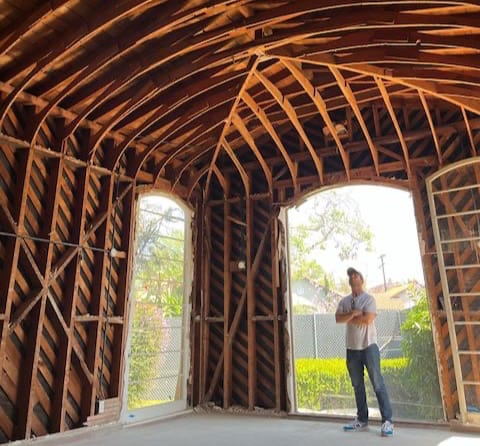Is Home Renovation for You?
4 Questions to Ask Yourself
Jay Evan Schoenfeldt | July 6, 2023
The housing market in LA is still short on inventory, especially move-in-ready properties. Houses that require work offer buyers opportunities to get into the market if they have the extra capital and time to take on some repairs.
Other benefits of buying a home in need of renovation:
🚪Choosing finishes that fit your design aesthetic
💰 Adding value to your home
🔨 Having control over the quality of the materials used and workmanship
🏡 Enjoying day-to-day life in surroundings that you created
But before you get to work, there are 4 key questions you’ll want to ask yourself. Take it from me. During my real estate career, I’ve completed 17 home renovation projects, including the Big Daddy, my latest and greatest — a down-to-the-studs restoration of my own residence.
Your answers to the following questions will help you better understand your needs so you can communicate them to your real estate agent, your contractor and even your partner, if applicable — ultimately saving you time, money and maybe even a few headaches.
1. How big do you want to go?
Renovations can range in size and scope. I’ve classified the different levels of renovation to help you identify and articulate what best fits your wants and needs.
Light Renovation. Taking on a light renovation usually means updating the surfaces and finish materials i.e.:
- Repainting
- Refinishing wood floors
- Replacing carpet with wood or tile
- Updating bathroom/kitchen cabinetry and plumbing fixtures, but keeping them in the same location
Medium Renovation. A medium renovation includes what’s outlined above plus updating or upgrading systems i.e:.
- Updating galvanized plumbing to copper
- Replacing old cloth wiring with safe, modern wiring
- Roof replacement
- Adding central air
- Rebuilding a fireplace
- Opening or moving walls to enhance the floor plan or design (This will require hiring an architect and a structural engineer)
Accessory Dwelling Unit (ADU). Converting an existing detached garage into living space is a great way to boost your property’s value. They are less invasive than renovations within your existing living space and fall somewhere between a medium and heavy renovation since they have a fairly lengthy planning phase and build-out timelines.
Heavy Renovation. Here you will be dealing with the components of a light and medium renovation, as well as building an addition/ADU or replacing/repairing structural aspects of the home.
The Big Daddy. This level of renovation encompasses all of the above plus moving exterior stucco, interior plaster/drywall and window replacement. It will require hiring an engineer to create plans that your contractor will submit to the city for permitting.
If you’re removing walls, reconfiguring a floor plan or building an addition, the property may require foundational work, shear walls, support beams, etc.
Chances are if you are currently living in your home, you are contemplating small updates that fall under a light renovation. If you are looking to purchase a home that needs to be renovated, the above can help you communicate what you are looking for to your real estate agent.
2. What is your renovation budget?
If renovating a home is something you’ve been considering, you likely have a creative mind to some degree. I certainly do and, for me, seeing my ideas come to life is what I love most about home renovation.
However, when it comes to creativity, the sky’s not the limit. It’s your budget. The amount of capital you have to work with will dictate, to some degree, how big you can go.
If the property is older and hasn’t been updated in decades, you may spend a considerable amount of your budget on system replacements alone: a new roof, electrical box and wiring, plumbing, sewer line replacement, and/or foundation repairs etc. These upgrades are not exciting, but they are necessary.
Before you meet with contractors, you’ll want to know how much money you have available for renovation and be willing to spend an additional 15% to 30% on contingency surprises.
3. How much free time do you have?
There are 24 hours in a day. How do you want to spend them? Take stock of your current commitments, whether they be work, family or play. Do you have time in your schedule to dedicate to a renovation? If so, what level of renovation works for you?
If you have a full schedule, you may have to remove things from your schedule to give your project the attention it deserves.
For example, my partner has a demanding job working conventional business hours, and I work with clients on both weekdays and weekends. We both had to give up some of our personal time and miss out on a few social engagements to focus on making decisions for our home renovation. However, these are short-term sacrifices for long-term gains.
4. Will you be working with a partner?
Speaking of partners, are you renovating with one? Whether they are a business partner or a significant other, renovating a home with a partner is very different from renovating a home on your own.
When you’re working solo, you can call the shots without compromise. However, when you’re working with a partner, you need to communicate and come to a consensus on a variety of decisions.
In my own experience, if you can identify your strengths (and come to terms with your weaknesses), it will be of service to your partnership and your project.
In an ideal world, you and your partner would have different but complementary skills. Discuss the roles each of you will play prior to starting a project and play to each other’s strengths.
My significant other is amazing at sourcing finishes and has an astute eye for style. I, on the other hand, look at construction materials like Legos. I am keenly aware of whether or not a wall is plumb, floors are level, project timelines and budgets. We both have strong opinions. Sometimes they align and sometimes they don’t. But no matter what, we respect one another, making sure each of us feels heard.
Key Takeaways
Purchasing a home in need of renovation is a great way to get into the housing market — especially in Los Angeles, where move-in-ready homes are scarce. However, before you buy a home and begin any project, you need to carefully consider the size and scope of the renovation you’re willing and able to take on, keeping in mind your budget and time commitments.
Knowing this will enable you to better communicate your wants and needs to a real estate agent, a contractor and even a partner — ultimately saving you time, money and stress. This way, you can enjoy seeing your creativity come to life and living in a space that’s truly your own.
Whether you’re looking for a home you can renovate or one that’s turnkey, we would be happy to help.















